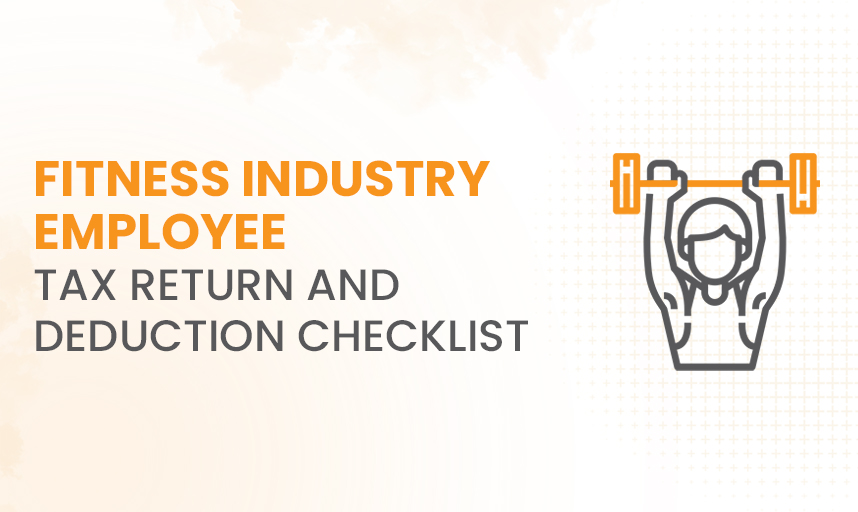Fitness Industry Employee Tax Return And Deduction Checklist

Are you working in the fitness industry?
Although your body is fit, taxes affect your mental health.
Well, taxes can be confusing for anybody, even if you have six-pack abs also. 🙂
However, it can be manageable with the right experts like KPG Taxation or if you know what to claim and what not to.
There are many work-related expenses you can claim as a deduction, potentially reducing your tax bill and putting more money in your pocket.
So we decided to share a checklist of common deductions for fitness professionals.
Let’s check it out!
Requirement Of Income Statement
Your tax return begins with an income statement from your employer, detailing your salary, wages, allowances, and bonuses for the financial year.
This summary, previously known as a “payment summary” or “group certificate,” should be lodged by your employer directly with the ATO.
Once lodged, you can access the information to calculate your deductions accurately.
Common Deductions For Fitness Professionals
As an employee in the fitness industry, you’re eligible to claim deductions on expenses directly related to earning your income.
However, remember two key criteria: you must have personally spent the money, and you must keep records such as receipts or invoices.
Eligible Deductions
You can claim a variety of deductions, including:
| Expense | Eligibility |
| Car expenses | When travelling between different job locations on the same day |
| Work clothing and protective gear | Items distinctive to your company or offering protective benefits |
| Equipment purchases and repairs | Tools specifically required for your work, such as hand-held weights or a yoga mat |
| Overtime meal expenses | If included in your assessable income under industrial law or agreement |
| Self-education costs | Courses, training, or seminars directly related to your current line of work |
| First aid training course | If required for emergency work situations |
| Subscriptions and membership fees | Work-related subscriptions or memberships |
| Phone and internet expenses | For work-related usage on personal devices |
| Home office or studio expenses | Including heating, cooling, and equipment repairs |
| Travel expenses | Accommodation and meals for work-related travel |
1 Travel
If you travel between workplaces or client appointments, you can claim the cost of travel, including car expenses (at a set rate per kilometre or based on actual expenses with a logbook) or public transport fares.
Example: Sarah, a personal trainer, travels between two gyms to work with clients. She can claim the car expenses for these journeys.
2 Work Clothing and Equipment
Clothing with your employer’s logo or required safety gear (like sun protection for outdoor classes) is claimable.
Regular gym clothes (tracksuits, t-shirts) are not, even if you only wear them to work.
Fitness equipment costing less than $300 can be deducted immediately, with more expensive equipment deducted over its lifespan.
Example: David, a yoga instructor, purchases a new yoga mat for $150 to use with clients. He can claim the full cost of the mat as a deduction.
3 Self-Education
Upskilling is crucial in fitness. The cost of courses, workshops, and certifications directly related to your current job (like a pilates instructor attending a workshop on advanced pilates techniques) can be deducted.
Example: Lisa, a fitness instructor, takes a course to become a certified spin instructor. The course fees are tax-deductible.
4 Phone and Internet
If you use your personal phone or Internet for work-related purposes (like scheduling client sessions or accessing online fitness resources), you can claim a portion of the associated costs.
Example: Michael, a personal trainer, uses his phone for calls and texts with clients. He estimates 20% of his phone bill is work-related, so he can claim 20% of the cost as a deduction.
A Few Additional Considerations
While gym memberships are generally not claimable for fitness professionals, there are some exceptions for professional athletes who require an exceptional level of fitness.
Expenses incurred for maintaining your own fitness level (e.g., gym membership for personal use) are not deductible.
Expenses You Can't Claim
With many deductions you can claim, here are a few which you cannot:
- Regular Clothing: While work-related uniforms with company logos are deductible, ordinary clothing worn to your workplace, such as plain tracksuit pants or t-shirts, cannot be claimed. Even if you purchased these items specifically for work purposes, they are not eligible for deduction.
- Childcare Costs: Any expenses incurred for childcare while you’re working cannot be claimed as deductions on your tax return. These costs, although necessary for employment, do not qualify for tax relief.
- Career Transition Education: Courses or training aimed at transitioning into a different career, such as undertaking a yoga teacher training course while working as a personal trainer, are not deductible. The ATO distinguishes between education directly related to your current employment and that which is intended for career changes.
- Meals During Normal Workdays: The cost of meals or snacks consumed during a typical workday, even if not provided by your employer, cannot be claimed as deductions. This includes meals purchased during breaks or while on the job, regardless of whether an allowance is received from your employer.
- Commuting Expenses: Expenses incurred when travelling between your home and your workplace, including parking fees and tolls, are not deductible. The ATO does not consider these costs as directly related to earning an income and therefore does not allow them as deductions.
Looking For Expert Taxation Advice?
With a tough routine, it can be really difficult to understand the various tax deductions, especially as a fitness industry employee!
However, following this checklist and consulting with tax specialists at KPG Taxation can ensure you make the most of your claimable deductions.
These tax professionals will offer you the right guidance to help you file your tax return, and help you claim only those deductions to which you’re entitled, thereby avoiding any penalties or enquiries from the ATO.
- Categories
- Tax Return

Focus On Growing Your Business, Leave The Accounting On Us!
- Income Tax : File your taxes & get the best claims & returns.
- Accountancy : Hire expert accountants to manage your transactions.
- Bookkeeping : Let us handle your record books and expense reports.
- Business Advisory : From company set-up to payroll, we handle it all.



